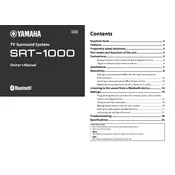Yamaha SRT-1000 Owner's Manual


To connect your Yamaha SRT-1000 to a TV, use an HDMI cable to connect the HDMI OUT on the SRT-1000 to the HDMI IN on your TV. Ensure that the TV's audio output is set to HDMI.
First, check that the SRT-1000 is powered on and the volume is turned up. Ensure all cables are securely connected. If using HDMI, check that the TV's audio output is set correctly.
The Yamaha SRT-1000 has a subwoofer out port that allows you to connect an external subwoofer using a standard subwoofer cable.
To perform a factory reset, press and hold the power button for about 10 seconds until the SRT-1000 turns off. Release the button and power it back on.
For optimal sound quality, place the SRT-1000 centrally in front of your seating area and on a flat surface, ideally below your TV.
Yes, if your TV supports HDMI-CEC, you can control the SRT-1000 with your TV remote once CEC is enabled on both devices.
To update the firmware, download the latest firmware from Yamaha's website onto a USB drive. Insert the USB drive into the SRT-1000 and follow the on-screen instructions.
Check if the batteries in the remote control need replacing. Ensure there are no obstructions between the remote and the SRT-1000. Also, try resetting the remote by removing the batteries and pressing all buttons.
Activate Bluetooth on your smartphone and search for devices. Select "Yamaha SRT-1000" from the list of available devices to pair and connect.
Yes, the Yamaha SRT-1000 can be integrated with some smart home systems using compatible apps or devices that support Bluetooth or HDMI-CEC connections.